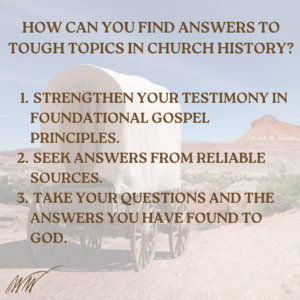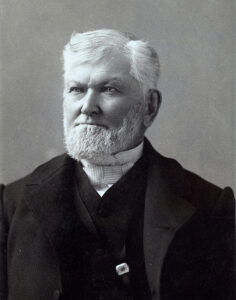Asking Big Questions

 Have you ever had a question about a topic in Church history? Because we were not there, some Church history events and topics can be hard for us to understand. For example, plural marriage, also known as polygamy, is a difficult topic for many members of the Church. So how do we approach questions about topics like plural marriage? Here are three ideas:
Have you ever had a question about a topic in Church history? Because we were not there, some Church history events and topics can be hard for us to understand. For example, plural marriage, also known as polygamy, is a difficult topic for many members of the Church. So how do we approach questions about topics like plural marriage? Here are three ideas:
- Strengthen our testimony in foundational gospel principles.
- Seek answers from reliable sources.
- Take our questions, and the answers we have found through personal study, to God.
Strengthen Your Testimony in Foundational Gospel Principles
First, we should strengthen our testimony in foundational gospel principles. In his talk “Lord, I Believe,” Elder Jeffrey R. Holland advised listeners to “hold fast to what you already know and stand strong until additional knowledge comes” when searching for answers.[1] As we strengthen our faith in our loving Heavenly Father, show love for His Son, Jesus Christ, and develop confidence in the restored gospel, we can navigate challenging questions from a faith-filled perspective.
In 2 Nephi 28:30 the Lord says, “I will give unto the children of men line upon line, precept upon precept, here a little and there a little; and blessed are those who hearken unto my precepts, and lend an ear unto my counsel, for they shall learn wisdom; for unto him that receiveth I will give more; and from them that shall say, We have enough, from them shall be taken away even that which they have.”
Sometimes we don’t have all the answers right away. But the Lord has promised us that He will give us answers, “line upon line, precept upon precept, here a little and there a little.” We can focus on what we do know and take comfort in the promise that we will be given more knowledge.
Seek Answers from Reliable Sources
Second, we can seek answers from multiple reliable sources. In a world with so much information and misinformation at our fingertips, we can easily get lost in it all. Luckily, many great primary sources can help us find answers. Scriptures, general conference talks, and the Church website can provide us with valuable, factual information. President Dallin H. Oaks counseled Church members to seek information “from sources that are qualified on the subject and free from selfish motivations.”[2]
Take plural marriage, for example. If you seek answers from reliable sources with a faith-filled perspective, you learn that plural marriage was a practice adopted by the Church in the nineteenth century. Almost fifty years after it was implemented, President Wilford Woodruff ended plural marriage through revelation outlined in the document we know today as Official Declaration 1 or the Manifesto.
The primary reason plural marriage was started and ended is summarized in a gospel topics essay released by the Church titled “The Manifesto and the End of Plural Marriage.” The explanation is stated simply: “The beginning and end of the practice were directed by revelation through God’s prophets.”[3]
Although we may not understand all the reasons Joseph Smith was commanded to start the practice of plural marriage or all the reasons Wilford Woodruff was commanded to stop the practice, developing faith and trust in the process of revelation will bless our lives and help us come closer to God.
Additionally, learning the context surrounding plural marriage can be helpful in answering a few questions about the perspective of those who followed the revelations received by God’s prophets. The Saints faced much opposition to plural marriage, beginning in the 1840s and lasting into the 1890s. Laws were passed to put an end to their religious freedoms and take away their civil rights and property, and dissolve the Church itself.
Finally, in 1890, the government threatened to confiscate the temples. President Woodruff worried about “the laws of the nation against [plural marriage] and the opposition of sixty millions of people, and at the cost of the confiscation and loss of all the Temples, and the stopping of all the ordinances therein, both for the living and the dead.”[4] The Saints were faced with either stopping the practice of polygamy or losing the temples and access to the blessings of temple ordinances. When the situation escalated to this point, Wilford Woodruff sought additional revelation and direction from the Lord. Shortly after, President Woodruff issued Official Declaration 1.
Another important source we have for discovering truth is the Holy Ghost. Listening to guidance from the Spirit and acting in faith can help us find important answers. You can read more about finding and evaluating sources of truth here.
Take Your Questions and the Answers You Have Found to God
Third, after our personal study in seeking answers, we can take our conclusions to God for confirmation. The end of polygamy was hard for the Saints, and many members had questions about why the Manifesto was issued. Wilford Woodruff understood the Saints’ concerns about their families and the struggle they had endured to embrace polygamy, so after Official Declaration 1 was read in general conference, he counseled them not to just take his word for it. He said, “Go unto God yourselves, if you are tried over this and cannot see its purpose; go to your secret chambers and ask God and plead with Him, in the name of Jesus, to give you a testimony as He has given it to us, and I promise you that you will not come away empty, nor dissatisfied; you will have a testimony, and light will be poured out upon you, and you will see things that perhaps you cannot see and understand at the present time.”[5]
Conclusion
Even though it can be hard to understand some topics in Church history, there are many ways we can find answers. We can strengthen our testimony in the gospel principles we do know, seek answers from reliable sources, and ask Heavenly Father about the answers we have found. By doing so, we can find peace and confidence in our journey of faith, knowing that continuous seeking and learning bring us closer to the truth and to our Heavenly Father.
- Question: Will our manifestation of truth from the Holy Ghost be a “spectacular” witness?
- Question: Why might someone not be able to see their spiritual impressions come to successful, obvious, and/or beautiful fruition?
- Question: Can spiritual experiences be simply willed to reality?
- Question: Can one simply decide when one feels and doesn’t feel the Spirit?
Kamryn Maughan is studying Family Life at Brigham Young University. She joined the Wilford Woodruff Papers Project and was drawn to its mission to deepen and strengthen faith through President Woodruff’s documents and history. Kamryn has a big, loving family who she recently reunited with after serving in Oklahoma as a missionary for The Church of Jesus Christ of Latter-day Saints. She loves hiking, playing card games, and watching movies with her family and friends.
Endnotes
- [1] Jeffrey R. Holland, “Lord, I Believe,” April 2013 general conference, ChurchofJesusChrist.org.
[2] Dallin H. Oaks, “Truth and the Plan,” October 2018 general conference, ChurchofJesusChrist.org.
[3] The Manifesto and the End of Plural Marriage, Gospel Topics Essays, ChurchofJesusChrist.org.
- [4] Discourse by Wilford Woodruff, November 1, 1891, p. 2, The Wilford Woodruff Papers, wilfordwoodruffpapers.org/discourse/1891-11-01.
- [5] Discourse by Wilford Woodruff, October 6, 1890, p. 2, The Wilford Woodruff Papers, wilfordwoodruffpapers.org/discourse/1890-10-06.
The Wilford Woodruff Papers Foundation’s mission is to digitally preserve and publish Wilford Woodruff’s eyewitness account of the Restoration of the gospel of Jesus Christ from 1833 to 1898. It seeks to make Wilford Woodruff’s records universally accessible to inspire all people, especially the rising generation, to study and to increase their faith in Jesus Christ. For more information, visit wilfordwoodruffpapers.org.



